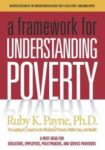
by Ruby K. Payne, Ph.D. Revised edition 2005
Interesting book! Shines a light on how and why students who live in poverty think and behave the way they do; and how teachers, counselors, and administrators can provide the necessary supports which would enable them to move out of poverty. Schools are almost the only hope for poor students to move out of that culture.
There are different types of poverty; not just financial: 1. Financial, 2. Emotional, 3. Mental, 4. Spiritual, 5. Physical, 6. Support Systems, 7. Relationships/Role Models, 8. Knowledge of Hidden Rules.
“Emotional resources are the most important of all resources because, when present, they allow the individual not to return to old habit patterns.”
People living in poverty tend to live for the moment, to spend money when they have it, to value entertainment. Their families tend to be matriarchal. Their language is in the “casual register,” and they may not know or understand the formal register, which is the register the middle class and wealthy people use.
The story structure of the “casual register” is not the same as the “formal register.” The formal register goes from beginning to end. The casual register starts with the end or the most emotional part of the story and relates the story in parts with audience participation in between the parts.
Relationships are very important. Schools could help by allowing students to stay with the same teacher two years in a row.
Here are characteristics of children of poverty:
‘-disorganized, lose papers, no signatures
-many excuses why something is missing
-don’t do homework
-physically aggressive
-like to entertain
-only see part of what is on the page
-only do part of the assignment
-can’t seem to get started
-cannot monitor their own behavior
-laugh when they are disciplined
-decide whether or not they will work in your class, based on whether or not they like you
-tell stories in the casual-register structure
-don’t know or use middle-class courtesies
-dislike authority
-talk back
“An education is the key to getting out of, and staying out of, generational poverty.” “Individuals leave poverty for one of four reasons: a goal or vision of something they want to be or have; a situation that is so painful that anything would be better; someone who “sponsors” them (i.e., an educator or spouse or mentor or role model who shows them a different way or convinces them that they could live differently); or a specific talent or ability that provides an opportunity for them.”
There are three voices:
“The Child Voice – Defensive, victimized, emotional,whining, losing attitude, strongly negative non-verbal.”
“The Parent Voice: Authoritative, directive, judgmental, evaluative, win-lose mentality, demanding, punitive, sometimes threatening.”
“The Adult Voice: Non-judgmental, free of negative non-verbal, factual, often in question format, attitude of win-win.”
Many children in poverty have become the parents of their household. Teachers should not use the Parent voice under any circumstances – it causes anger. Always use the Adult Voice.
IQ tests do not measure intelligence; they measure acquired information, and the information is that of middle-class America. If IQ tests were made for the culture of poverty, middle-class and wealthy students would score 9 points lower on average.
In creating relationships, there is a chart about making deposits to create the relationship:
“Seek first to understand. Keeping promises. Kindnesses, courtesies. Clarifying expectations. Loyalty to the absent. Apologies. Open to feedback. “
Versus withdrawals to a relationship: “Seek first to be understood. Breaking promises. Unkindnesses, discourtesies. Violating expectations. Disloyalty, duplicity. Pride, conceit, arrogance. Rejecting feedback.”
Good rules for life, not just for teaching.
In the Conclusion:
“Yet another notion among the middle class and educated is that if the poor had a choice, they would live differently. The financial resources would certainly help make a difference. Even with the financial resources, however, not every individual who received those finances would choose to live differently. There is a freedom of verbal expression, an appreciation of individual personality, a heightened and intense emotional experience, and a sensual, kinesthetic approach to life usually not found in the middle class or among the educated. These patterns are so intertwined in the daily life of the poor that to have those cut off would be to lose a limb. Many choose not to live a different life. And for some, alcoholism, laziness, lack of motivation, drug addiction, etc.,, in effect make the choices for the individual.
“But it is the responsibility of educators and others who work with the poor to teach the differences and skills/rules that will allow the individual to make the choice. As it now stands for many of the poor, the choice never exists.”